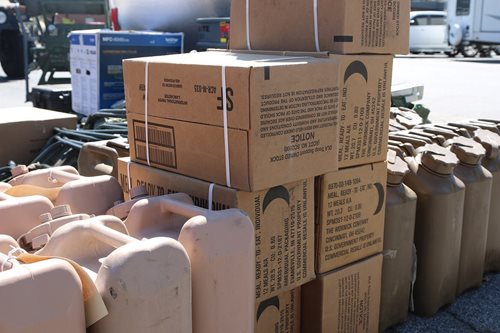
First there was Harvey, then Irma. Clean-up and emergency relief efforts are still underway in Texas, Florida and surrounding regions. Now the Northeast is bracing for possible impact from Hurricanes Jose and Maria. So if you're looking to haul FEMA freight, or to help with disaster recovery, there's still plenty to do.
Trucks, warehouse space, and logistics services are needed in Florida, Georgia and even Texas, and they may be required soon in Massachusetts or New Jersey. You can volunteer or look for paid work. The paying jobs typically offer great rates, but that's because they are complicated, difficult, and sometimes risky for the driver and the rig.
There are a few things you should know before you accept a load, especially if you're the driver. Information is available online, but you may need to do extra research before you get started with emergency freight for FEMA and other organizations.
How can you help?
Find FEMA loads or trucks. Many freight brokers, including some of the largest 3PLs, have been charged with moving and warehousing emergency freight. They may be handling this work on behalf of FEMA itself, or for a non-governmental agency like the American Red Cross. If you're a broker, and your customers have emergency freight, you may be working in an unfamiliar area where you don't have a lot of carrier contacts. Look for trucks posted on DAT load boards with a destination near the storm-affected area, or use the LaneMakers tool in DAT Power to find carriers that run those lanes often.
Provide warehousing or trucks for non-FEMA relief. After the storm has passed, there will be a lot of stores and warehouses that need re-stocking, because inventory was either sold out or ruined by the floods. Brokers and carriers can learn about immediate needs at American Logistics Aid Network (ALAN) which provides a handy map and list of aid requests. This won't necessarily be FEMA freight, but it could still be emergency relief, because there is urgent need for so many products, as local people try to put their lives back together.
Don't become part of the problem. Safety is your number-one priority at all times, of course, but when you're heading into a disaster area, conditions can be hazardous well after the storm has passed. Be sure to check your routes. If you're the broker or dispatcher, learn as much as you can about the loads, the routes and the loading or unloading environment before you assign the truck. For example, there are a couple of section of interstate highways that are still closed due to high water in Houston, and many other roads are closed or partially closed for repairs, usually at night. Look at a map of road closures in Houston or Florida, sign up for alerts in the states you expect to drive through, or call 511 before you go. Brokers and dispatchers should be sure to give the driver an emergency contact number and be sure you don't encourage risky behavior.
Fuel is not always available. Gas stations in Florida were running out of every kind of fuel, as hundreds of thousands of people were attempting to evacuate. After the storm passed, the shortages got bad again in Southern Georgia, as the evacuees headed home. Check on fuel availability before starting out.
If you can't go, you can still donate. The American Red Cross has a special donation site for hurricane relief. DAT employees are donating there, and the company is matching those funds. Many other organizations are also helping out, including organizations like the ASPCA and the Humane Society that focus on evacuating shelter animals to make room for local pets who need a place to go during the storm. Unfortunately, some scamsters are also out there pretending to be relief organizations so they can steal your money. To be sure you are giving to a legitimate relief organization, check out National Voluntary Organizations Active in Disasters (NVOAD) which publishes "How to Help" advice and resources.
Remember that you can also help with disaster relief just by doing your everyday job. Massive numbers of loads have been re-scheduled and re-routed in recent weeks, and shippers are desperate for help, just to re-stock warehouses and distribution centers, which in turn, re-stock store shelves all over the country. That's especially important in the storm-affected areas.
I have a cousin in Miami who made it through Hurricane Irma safely with her family, but they ended up with a week-long power outage and a stinky mess in the house from piles of seaweed, plus three kids and two dogs who could not go outside for days. You'd better believe that when it was safe to drive, my cousin was on her way to Publix or Walmart for carpet shampoo, bottled water, coffee, fresh food, and maybe a new bottle of ibuprofen. If you helped move those loads from Columbus to Atlanta, and those items eventually ended up on the shelf in that Publix store in Miami, you helped to restore hope and a sense of normalcy for my cousin and her neighbors. That's a big win.